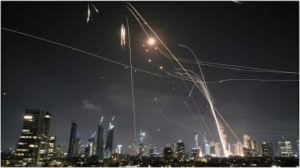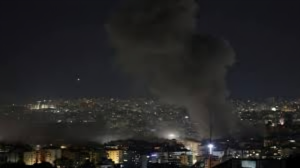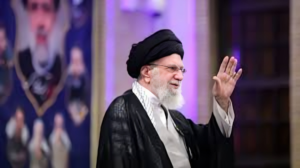Iran Signals End to Hostilities and Will Resume Nuclear Talks—एक शर्त के साथ
Introduction
In a striking diplomatic overture, Iran has indicated its readiness to halt hostilities and return to talks over its nuclear program—but on one non‑negotiable condition. यह शर्त यह है कि अमेरिकी सेनाएँ और हथियार संघर्ष के मैदान में शामिल न हों। As tensions have escalated in the Middle East, Tehran’s message offers a glimmer of hope for de‑escalation, provided its core demand is met. This development not only affects regional stability but also carries profound implications for global energy markets, non‑proliferation efforts, and international diplomacy.

The Background: A Region on Edge
Over recent weeks, Israeli airstrikes have targeted multiple Iranian military and nuclear‑related sites, prompting Tehran to respond with missile salvos aimed at strategic positions in Israel. The exchange raised fears of a wider conflagration that could engulf neighboring states and disrupt global oil supplies. Against this backdrop, Iran’s willingness to speak of renewed negotiations marks a significant pivot in its public stance.
- Escalation Dynamics: Israeli strikes have focused on missile launchers and suspected nuclear‑adjacent facilities.
- Iranian Response: Retaliatory attacks have underscored Tehran’s capacity to reach key Israeli infrastructure.
- Global Repercussions: Oil prices briefly spiked on fears of a broader regional war, while stock markets fluctuated on diplomatic headlines.
By signaling a ceasefire, Iran aims to shift from open conflict back to the diplomatic arena, where its grievances can be addressed through formal channels.
The One Condition: No U.S. Involvement
At the heart of Tehran’s proposal is a clear red line: any U.S. military presence or participation in the hostilities must be ruled out. Iran’s leadership maintains that American forces supporting Israeli operations would undermine the legitimacy of negotiations and risk turning a localized conflict into a direct confrontation between Tehran and Washington.
- Sovereign Integrity: Iran insists on managing regional security without external intervention.
- JCPOA Context: The original 2015 nuclear accord involved only the P5+1 (U.S., UK, France, Russia, China, Germany). Iran sees no role for U.S. combat forces in future talks.
- Diplomatic Channels: Messages have been relayed via Qatar and Oman—countries with ties to both Washington and Tehran—to emphasize Iran’s preference for mediated discussions.
This condition reflects longstanding Iranian distrust of American intentions, dating back to the U.S. withdrawal from the JCPOA in 2018.
What Resuming Nuclear Talks Entails
Renewed dialogue would center on restoring and potentially enhancing the 2015 Joint Comprehensive Plan of Action (JCPOA), which limited uranium enrichment and subjected Tehran’s nuclear activities to stringent inspections in return for sanctions relief. Key agenda items would include:
- Enrichment Levels: Negotiating acceptable thresholds for uranium purity.
- Inspection Regime: Ensuring uninterrupted access for International Atomic Energy Agency (IAEA) inspectors.
- Sanctions Relief: Gradual rollback of U.S. and EU economic measures in exchange for verifiable compliance.
- Regional Security Guarantees: Addressing Iran’s concerns about hostile actions targeting its nuclear sites.
Resuming talks could also open discussions on a broader security framework for the Gulf, potentially involving arms‑control measures and confidence‑building steps among rival states.

Implications for Regional Stability
A successful de‑escalation and revival of nuclear negotiations would reverberate across the Middle East:
- Reduced Military Risk: Lower likelihood of direct clashes between Israeli and Iranian forces.
- Energy Market Relief: Calmer oil markets as the threat to shipping lanes and production facilities diminishes.
- Diplomatic Momentum: Could encourage parallel talks on Syria, Yemen, and other contested arenas.
- Confidence‑Building: May pave the way for limited cooperation on humanitarian issues, such as water scarcity and refugee assistance.
Conversely, any breakdown over the U.S. participation clause might harden Iran’s stance, prompting further retaliation and entrenching the cycle of violence.
Real‑World Examples of Conditional Diplomacy
Conditional offers are not new in international relations. Consider:
- South Africa’s Nuclear Exit (1989): Pretoria agreed to dismantle its weapons program only after security assurances from Western powers.
- North Korea’s Freeze Deals: Past agreements stalled when external enforcement mechanisms were deemed intrusive by Pyongyang.
- Libya’s Denuclearization (2003): Col. Gaddafi relinquished WMD ambitions following clear guarantees against regime change by the U.S. or NATO.
These cases illustrate how trust deficits can shape the terms and longevity of arms‑control pacts.
What Comes Next: Roadmap to Talks
For Iran and its counterparts to move forward, several steps must unfold:
- Intermediary Confirmation: Qatar and Oman to secure verbal or written agreement on U.S. non‑involvement.
- Track‑II Dialogues: Initial back‑channel meetings with IAEA and P5+1 envoys.
- Multilateral Summit: Formal convening in Vienna or a Gulf capital to outline a joint statement of intent.
- Working Groups: Establish technical committees on enrichment, inspections, and sanctions.
- Implementation Phases: Gradual compliance milestones tied to parallel relief measures.
Each phase would require robust verification protocols to build and maintain mutual confidence.
Conclusion
Iran’s conditional offer to cease hostilities and renew nuclear negotiations represents a critical juncture for Middle East diplomacy. Its insistence on excluding U.S. military involvement underscores deep strategic concerns that must be addressed for any dialogue to succeed. If all parties can navigate these red lines with creativity and compromise, the region may escape the brink and return to a rules‑based framework. अन्यथा, संघर्ष की गूंज और भी गहरी होगी, जिसका खामियाजा केवल स्थानीय नहीं, बल्कि वैश्विक स्तर पर भुगतना पड़ेगा। The next few days will reveal whether pragmatism or polarization prevails—and whether a fragile peace can be engineered from the ashes of conflict.
